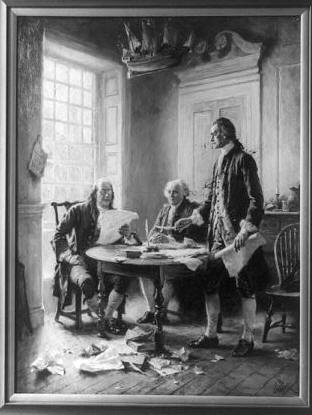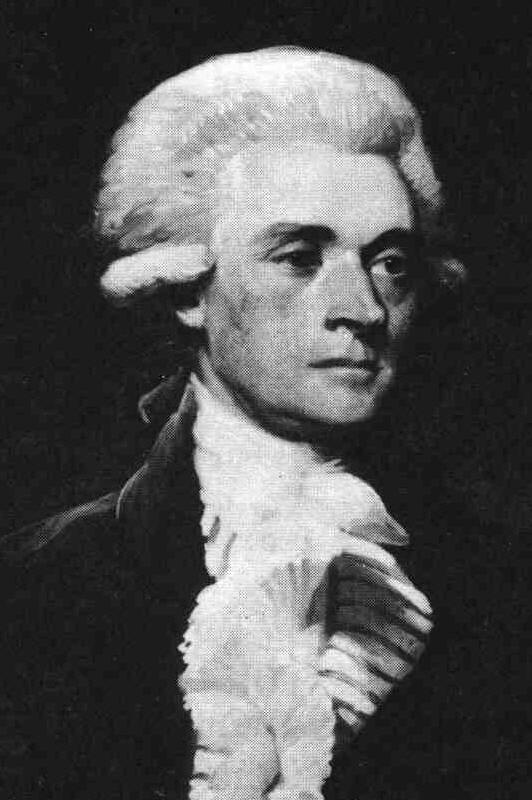 Thomas Jefferson
Thomas Jefferson
Our declaration did he not write?
Powerful of
mind,

Life with liberty his delight.
Our third President
Jefferson was very much a free thinker and very pragmatic. He believed in Jesus and the doctrines of Jesus. What he did not believe were miracles attributed to Him, nor did he believe that the Bible came to us in its pure form.
He believed Christianity was the best support for a good government but he detested priests who thought they were gods, that hid the truth to take advantage of those less educated, as was the case in England before the Protestants.
He did not think uniformity of religion was possible; in fact, in the attempt toward uniformity by coercion, evil enters to bring fines, prison, and torture. Christianity may be promoted but must be promoted and accepted voluntarily from the heart without coercion.
Two days after Jefferson issued the often-quoted Danbury Baptist letter, he attended church services held in the House of Representatives at the Capitol, January 3, 1802. This is verified in a diary kept by Manasseh Cutler, a Federalist Congressman from Massachusetts and Congregational minister. John Leland was the preacher of that day's sermon.
Below quotes are attributed to Jefferson:
The reason that Christianity is the best friend of government is because Christianity is the only religion that changes the heart.
Among the most inestimable of our blessings, also, is that... of liberty to worship our Creator in the way we think most agreeable to His will; a liberty deemed in other countries incompatible with good government and yet proved by our experience to be its best support. Thomas Jefferson: Reply to John Thomas et al., 1807. ME 16:291
Of all the systems of morality, ancient or modern which have come under my observation, none appears to me so pure as that of Jesus.
In every country and in every age, the priest has been hostile to liberty. He is always in alliance with the despot, abetting his abuses in return for protection to his own. Thomas Jefferson, letter to Horatio G. Spafford, March 17, 1814
Priests...dread the advance of science as witches do the approach of daylight and scowl on the fatal harbinger announcing the subversions of the duperies on which they live. Thomas Jefferson, Letter to Correa de Serra, April 11, 1820
May it be to the world, what I believe it will be, (to some parts sooner, to others later, but finally to all,) the signal of arousing men to burst the chains under which monkish ignorance and superstition had persuaded them to bind themselves, and to assume the blessings and security of self-government. All eyes are opened, or opening, to the rights of man. The general spread of the light of science has already laid open to every view the palpable truth, that the mass of mankind has not been born with saddles on their backs, nor a favored few booted and spurred, ready to ride them legitimately, by the grace of God. Thomas Jefferson, letter to Roger C. Weightman, June 24, 1826 (in the last letter he penned. Note: Jefferson did not believe the "light of science" extended to evolution. He was a creationist.
I am a real Christian, that is to say, a disciple of the doctrines of Jesus.
It is not to be understood that I am with him [Jesus] in all his doctrines. I am a Materialist. In letter to John Adams
Among the sayings and discourses imputed to him [Jesus] by his biographers, I find many passages of fine imagination, correct morality, and of the most lovely benevolence; and others again of so much ignorance, so much absurdity, so much untruth, charlatanism, and imposture, as to pronounce it impossible that such contradictions should have proceeded from the same being. Jefferson, letter to William Short, April 13, 1820
If we could believe that he [Jesus] really countenanced the follies, the falsehoods, and the charlatanism which his biographers [Matthew, Mark, Luke, and John] father on him, and admit the misconstructions, interpolations, and theorizations of the fathers of the early, and the fanatics of the latter ages, the conclusion would be irresistible by every sound mind that he was an impostor. (Note: Roger Sherman might disagree with that. Thomas Jefferson described Roger Sherman as "a man who never said a foolish thing in his life." )
The whole history of these books [the Gospels] is so defective and doubtful that it seems vain to attempt minute enquiry into it: and such tricks have been played with their text, and with the texts of other books relating to them, that we have a right, from that cause, to entertain much doubt what parts of them are genuine. In the New Testament there is internal evidence that parts of it have proceeded from an extraordinary man; and that other parts are of the fabric of very inferior minds. It is as easy to separate those parts, as to pick out diamonds from dunghills. Jefferson, letter to John Adams, January 24, 1814
God who gave us life gave us liberty. And can the liberties of a nation be thought secure when we have removed their only firm basis, a conviction in the minds of the people that these liberties are a gift from God? That they are not to be violated but with His wrath? Indeed I tremble for my country when I reflect that God is just, and that His justice cannot sleep forever. Inscribed on the walls of the Jefferson Memorial in the nations capital/ Merrill D. Peterson, ed., Jefferson Writings, (New York: Literary Classics of the United States, Inc., 1984), Vol. IV, p. 289. From Jefferson’s Notes on the State of Virginia, Query XVIII, 1781.]
Religion, as well as reason, confirms the soundness of those principles on which our government has been founded and its rights asserted. Thomas Jefferson to P. H. Wendover, 1815. ME 14:283
One of the amendments to the Constitution... expressly declares that 'Congress shall make no law respecting an establishment of religion, or prohibiting the free exercise thereof, or abridging the freedom of speech, or of the press,' thereby guarding in the same sentence and under the same words, the freedom of religion, of speech, and of the press; insomuch that whatever violates either throws down the sanctuary which covers the others. Thomas Jefferson: Draft Kentucky Resolutions, 1798. ME 17:382
Religion. Your reason is now mature enough to examine this object. In the first place, divest yourself of all bias in favor of novelty & singularity of opinion. Indulge them in any other subject rather than that of religion. It is too important, and the consequences of error may be too serious. On the other hand, shake off all the fears & servile prejudices, under which weak minds are servilely crouched. Fix reason firmly in her seat, and call to her tribunal every fact, every opinion. Question with boldness even the existence of a God; because, if there be one, he must more approve of the homage of reason, than that of blindfolded fear. You will naturally examine first, the religion of your own country. Read the Bible, then as you would read Livy or Tacitus. The facts which are within the ordinary course of nature, you will believe on the authority of the writer, as you do those of the same kind in Livy & Tacitus. The testimony of the writer weighs in their favor, in one scale, and their not being against the laws of nature, does not weigh against them. But those facts in the Bible which contradict the laws of nature, must be examined with more care, and under a variety of faces. Here you must recur to the pretensions of the writer to inspiration from God. Examine upon what evidence his pretensions are founded, and whether that evidence is so strong, as that its falsehood would be more improbable than a change in the laws of nature, in the case he relates. For example, in the book of Joshua, we are told, the sun stood still several hours. Were we to read that fact in Livy or Tacitus, we should class it with their showers of blood, speaking of statues, beasts, &c. But it is said, that the writer of that book was inspired. Examine, therefore, candidly, what evidence there is of his having been inspired. The pretension is entitled to your inquiry, because millions believe it. On the other hand, you are astronomer enough to know how contrary it is to the law of nature that a body revolving on its axis, as the earth does, should have stopped, should not, by that sudden stoppage, have prostrated animals, trees, buildings, and should after a certain time gave resumed its revolution, & that without a second general prostration. Is this arrest of the earth's motion, or the evidence which affirms it, most within the law of probabilities? You will next read the New Testament. It is the history of a personage called Jesus. Keep in your eye the opposite pretensions: 1, of those who say he was begotten by God, born of a virgin, suspended & reversed the laws of nature at will, & ascended bodily into heaven; and 2, of those who say he was a man of illegitimate birth, of a benevolent heart, enthusiastic mind, who set out without pretensions to divinity, ended in believing them, and was punished capitally for sedition, by being gibbeted, according to the Roman law, which punished the first commission of that offence by whipping, & the second by exile, or death in fureâ. See this law in the Digest Lib. 48. tit. 19. §. 28. 3. & Lipsius Lib 2. de cruce. cap. 2. These questions are examined in the books I have mentioned under the head of religion, & several others. They will assist you in your inquiries, but keep your reason firmly on the watch in reading them all.Do not be frightened from this inquiry by any fear of its consequences. If it ends in a belief that there is no God, you will find incitements to virtue in the comfort and pleasantness you feel in its exercise, and the love of others which it will procure you. If you find reason to believe there is a God, a consciousness that you are acting under his eye, & that he approves you, will be a vast additional incitement; if that there be a future state, the hope of a happy existence in that increases the appetite to deserve it; if that Jesus was also a God, you will be comforted by a belief of his aid and love. In fine, I repeat, you must lay aside all prejudice on both sides, and neither believe nor reject anything, because any other persons, or description of persons, have rejected or believed it. Your own reason is the only oracle given you by heaven, and you are answerable, not for the rightness, but uprightness of the decision. I forgot to observe, when speaking of the New Testament, that you should read all the histories of Christ, as well of those whom a council of ecclesiastics have decided for us, to be Pseudo-evangelists, as those they named Evangelists. Because these Pseudo-evangelists pretended to inspiration, as much as the others, and you are to judge their pretensions by your own reason, and not by the reason of those ecclesiastics. Most of these are lost. There are some, however, still extant, collected by Fabricius, which I will endeavor to get & send you. Excerpted from Jefferson's letter to Peter Carr, his nephew, from Paris, August 10, 1787.
Where the preamble declares, that coercion is a departure from the plan of the holy author of our religion, an amendment was proposed by inserting "Jesus Christ," so that it would read "A departure from the plan of Jesus Christ, the holy author of our religion;" the insertion was rejected by the great majority, in proof that they meant to comprehend, within the mantle of its protection, the Jew and the Gentile, the Christian and Mohammedan, the Hindoo and Infidel of every denomination. Thomas Jefferson, Autobiography, in reference to the Virginia Act for Religious Freedom
I never submitted the whole system of my opinions to the creed of any party of men whatever in religion, in philosophy, in politics, or in anything else where I was capable of thinking for myself. Such an addiction is the last degradation of a free and moral agent. Thomas Jefferson, letter to Francis Hopkinson, March 13, 1789
They [the clergy] believe that any portion of power confided to me, will be exerted in opposition to their schemes. And they believe rightly; for I have sworn upon the altar of god, eternal hostility against every form of tyranny over the mind of man. But this is all they have to fear from me: and enough, too, in their opinion. Jefferson to Dr. Benjamin Rush, Sept. 23, 1800
Believing with you that religion is a matter which lies solely between man and his God, that he owes account to none other for his faith or his worship, that the legislative powers of government reach actions only, and not opinions, I contemplate with sovereign reverence that act of the whole American people which declared that their legislature should 'make no law respecting an establishment of religion, or prohibiting the free exercise thereof,' thus building a wall of separation between church and State. Jefferson, letter to Danbury Baptist Association, CT., Jan. 1, 1802
History, I believe, furnishes no example of a priest-ridden people maintaining a free civil government. This marks the lowest grade of ignorance of which their civil as well as religious leaders will always avail themselves for their own purposes. Jefferson to Alexander von Humboldt, Dec. 6, 1813.
When he who denies to the Creator the power of endowing matter with the mode of action called thinking shall shew how he could endow the Sun with the mode of action called attraction, which reins the planets in the tract of their orbits, or how an absence of matter can have a will, and, by that will, put matter into motion, then the materialist may be lawfully required to explain the process by which matter exercises the faculty of thinking. When once we quit the basis of sensation, all is in the wind. To talk of immaterial existences is to talk of nothings. To say that the human soul, angels, god, are immaterial, is to say they are nothings, or that there is no god, no angels, no soul. I cannot reason otherwise: but I believe I am supported in my creed of materialism by Locke, Tracy, and Stewart.
At what age of the Christian church this heresy of immaterialism, this masked atheism, crept in, I do not know. But a heresy it certainly is. Jesus taught nothing of it. He told us indeed that `God is a spirit,' but he has not defined what a spirit is, nor said that it is not matter. And the antient fathers generally, if not universally, held it to be matter: light and thin indeed, an etherial gas; but still matter. Origen says `Deus reapse corporalis est; sed graviorum tantum corporum ratione, incorporeus.' Tertullian `quid enim deus nisi corpus?' and again `quis negabit deumesse corpus? Etsi deus spiritus, spiritus etiam corpus est, sui generis, in sua effigie.' St. Justin Martyr `{to Theion phamen einai asomaton oyk oti asomaton—epeide de to me krateisthai ypo tinos, toy krateisthai timioteron esti, dia toyto kaloymen ayton asomaton.}' And St. Macarius, speaking of angels says `quamvis enim subtilia sint, tamen in substantia, forma et figura, secundum tenuitatem naturae eorum, corpora sunt tenuia.' And St. Austin, St. Basil, Lactantius, Tatian, Athenagoras and others, with whose writings I pretend not a familiarity, are said by those who are, to deliver the same doctrine. Turn to your Ocellus d'Argens 97. 105. and to his Timaeus 17. for these quotations. In England these Immaterialists might have been burnt until the 29. Car. 2. when the writ de haeretico comburendo was abolished: and here until the revolution, that statute not having extended to us. All heresies being now done away with us, these schismatists are merely atheists, differing from the material Atheist only in their belief that `nothing made something,' and from the material deist who believes that matter alone can operate on matter. Thomas Jefferson, letter to John Adams, from Monticello, August 15, 1820; Merrill D. Peterson, ed., Thomas Jefferson: Writings, New York: Library of America, 1994, pp. 1440-1445.
In truth, the alliance between Church and State in England has ever made their judges accomplices in the frauds of the clergy; and even bolder than they are. For instead of being contented with these four surreptitious chapters of Exodus, they have taken the whole leap, and declared at once that the whole Bible and Testament in a lump, make a part of the common law; ante 873: the first judicial declaration of which was by this same Sir Matthew Hale. And thus they incorporate into the English code laws made for the Jews alone, and the precepts of the gospel, intended by their benevolent author as obligatory only in foro concientić; and they arm the whole with the coercions of municipal law. In doing this, too, they have not even used the Connecticut caution of declaring, as is done in their blue laws, that the laws of God shall be the laws of their land, except where their own contradict them; but they swallow the yea and nay together. Finally, in answer to Fortescue Aland's question why the ten commandments should not now be a part of the common law of England? we may say they are not because they never were made so by legislative authority, the document which has imposed that doubt on him being a manifest forgery. Thomas Jefferson, letter to Thomas Cooper, from Monticello, February 10, 1814; Merrill D. Peterson, ed., Thomas Jefferson: Writings, New York: Library of America, 1994, pp. 1321-1329.
For we know that the common law is that system of law which was introduced by the Saxons on their settlement of England, and altered from time to time by proper legislative authority from that time to the date of the Magna Charta, which terminates the period of the common law.... This settlement took place about the middle of the fifth century. But Christianity was not introduced till the seventh century; the conversion of the first Christian king of the Heptarch having taken place about the year 598, and that of the last about 686. Here then, was a space of two hundred years, during which the common law was in existence, and Christianity no part of it.... That system of religion could not be a part of the common law, because they were not yet Christians. Thomas Jefferson, letter to Dr. Thomas Cooper, February 10, 1814 http://www.geocities.com/jeffersonbible1/It is between fifty and sixty years since I read it [the Apocalypse], and I then considered it merely the ravings of a maniac, no more worthy nor capable of explanation than the incoherencies of our own nightly dreams. Thomas Jefferson, letter to General Alexander Smyth, Jan. 17, 1825
A great advocate for science, he also believed God and God's laws were part of science, not contradictory to it. When asked about evolution, Jefferson replied that he did not believe God would go about creating the world in such an inefficient manner.
Dickinson W. Adams, ed, et al, The Papers of Thomas Jefferson, Second Series (Princeton University Press, 1983)
Lester J. Cappon, ed, The Adams-Jefferson Letters, Vol. 2, (The University of North Carolina Press, 1959)
Julian P. Boyd, ed, The Papers of Thomas Jefferson, (Princeton University Press 1950--)
A.A. Lipscomb, Albert E. Bergh, eds. The Writings of Thomas Jefferson, (The Thomas Jefferson Memorial Assoc., 1903-1904)
http://etext.virginia.edu/jefferson/quotations/jeff1650.htm Image below by Ole Erekson, Engraver, c1876, Library of Congress
Relying, then, on the patronage of your good will, I advance with obedience to the work, ready to retire from it whenever you become sensible how much better choice it is in your power to make. And may that Infinite Power which rules the destinies of the universe lead our councils to what is best, and give them a favorable issue for your peace and prosperity.
Thomas Jefferson
from his First Inaugural Address In
Washington, D.C.
Wednesday, March 4, 1801
I
shall need, too, the favor of that Being in whose hands we are, who led our
fathers, as Israel of old,
 from their native
land and planted them in a country flowing with all the necessaries and comforts
of life; who has covered our infancy with His providence and our riper years
with His wisdom and power, and to whose goodness I ask you to join in
supplications with me that He will so enlighten the minds of your servants,
guide their councils, and prosper their measures that whatsoever they do shall
result in your good, and shall secure to you the peace, friendship, and
approbation of all nations.
from their native
land and planted them in a country flowing with all the necessaries and comforts
of life; who has covered our infancy with His providence and our riper years
with His wisdom and power, and to whose goodness I ask you to join in
supplications with me that He will so enlighten the minds of your servants,
guide their councils, and prosper their measures that whatsoever they do shall
result in your good, and shall secure to you the peace, friendship, and
approbation of all nations.
Thomas Jefferson
from his Second Inaugural Address
Monday, March 4, 1805
From
Jefferson's 1802 letter to the Danbury Baptist Association of Connecticut, we
read, "Believing with you that religion is a matter which lies solely
between Man & his God, that he owes account to none other for his faith or his
worship, that the legitimate powers of government reach actions only, & not
opinions, I contemplate with sovereign reverence that act of the whole American
people which declared that their legislature should 'make no law respecting an
establishment of religion, or prohibiting the free exercise thereof,' thus
building a wall of separation between Church & State." The First
Amendment applies to the national government, not state governments; and it
means that no religion needed to fear government interference of their worship.
Two days after writing the letter, Jefferson attended church services in the House of Representatives. He obviously did not intend that the government should be completely secular or antireligious.
It was in 1947 that the Supreme Court added that the wall "must be high and impregnable. We could not approve the slightest breach."
"Religion is a subject on which I have ever been most scrupulously reserved. I have considered it as a matter between every man and his Maker in which no other, and far less the public, had a right to intermeddle." Jefferson to Richard Rush, 1813.
When Washington, D. C., became the nation's capital, Congress voted that the Capitol building would also serve as a church building. Debates and Proceedings of the Congress of the United States (Washington: Gales and Seaton, 1853), Sixth Congress, p. 797, December 4, 1800. President Jefferson did not disapprove. He chose to attend church each Sunday at the Capitol.
http://www.loc.gov/exhibits/religion/rel06-2.html Library of CongressReserved Seats at Capitol Services
An early Washington "insider," Margaret Bayard Smith (1778-1844), a writer and social critic and wife of Samuel Harrison Smith, publisher of the National Intelligencer, wrote of Jefferson's attendance at church services in the House of Representatives: "Jefferson during his whole administration was a most regular attendant. The seat he chose the first day sabbath, and the adjoining one, which his private secretary occupied, were ever afterwards by the courtesy of the congregation, left for him."
Jefferson provided the service with paid government musicians to assist in its worship. He also began similar Christian services in his own Executive Branch, both at the Treasury Building and at the War Office. Records recently reprinted by James Hutson, Chief of the Manuscript Division of the Library of Congress. Religion and the Founding of the American Republic (Washington, D. C.: Library of Congress, 1998) p.84,89
He praised the use of a local courthouse as a meeting place for Christian services. The Writings of Thomas Jefferson, Albert Bergh, editor (Washington, D. C: Thomas Jefferson Memorial Association, 1904), Vol. XV, p. 404, to Dr. Thomas Cooper on November 2, 1822.
He told a Christian school that it would receive “the patronage of the government.” Letter of Thomas Jefferson to the Nuns of the Order of St. Ursula at New Orleans on May 15, 1804, original with New Orleans Parish. Brief Biography
Born in Virginia in 1743, Jefferson attended a preparatory school and
graduated from William and Mary College in 1762. He studied law and was
admitted to the bar to begin practice in 1767.
Picture courtesy of ushistory.org
His mother was Jane Randolph; and his
father Peter Jefferson was a successful planter and surveyor. From them
young Thomas inherited an estate, including slaves.
At age 26, he started building
Monticello, designing the home himself. When he
was twenty-nine years old, he married the woman he loved deeply, Martha Wayles
Skelton. When she died ten years later, he was in extreme distress and was
to marry never again.
He eventually freed two slaves in his
lifetime and five in his will. Those seven he released were the ones able
to make it on their own as skilled tradesmen. Two others had run away, and
Jefferson chose not to pursue them.
He was a member of the colonial House of Burgesses from 1769-1775, member of the Continental Congress, 1775 and 1776, Governor of Virginia, 1779-1781, member, State house of delegates, 1782, and again a Member of the Continental Congress, 1783-1784. He authored Statute of Virginia for Religious Freedom.
He was appointed a trade commissioner to France in 1784, and then succeeded
Benjamin Franklin as Minister to the King of France in 1785. He used this
time to study European classics and to send various items back home to
Monticello, items such as recipes, seeds, plants, statues, architectural
drawings, scientific instruments, and many books. He learned a love for
fine wines and began collecting them. He later became wine advisor to
Presidents Washington, Adams, Madison, and Monroe.
He was U.S. Secretary of State for
President George Washington, 1789-1793, and Vice President for John Adams,
1797-1801. Elected President in 1801, he purchased the Louisiana Territory
in 1803 and supported the Lewis and Clark expedition. He was reelected in
1804.
In 1809, he retired to Monticello, being succeeded as president in 1809 by James Madison. During this period, he sold his collection of books to the government as a great asset for the Library of Congress. At age 76, he helped found the University of Virginia. He achieved its charter, secured its location, designed its buildings, planned its curriculum, and served as the first rector.
It was on July 4, 1826, just hours before John Adams, that he died.
Happy is the man that findeth wisdom, and the man that getteth understanding.
Proverbs 3:13


Jefferson imported oil from Italy and mustard from France, introduced vanilla and macaroni to the U.S.
One of the recipes found at Monticello was this one (shown right) for vanilla ice cream--written by Jefferson.
1780s, Manuscript Division, Library of Congress
Ingredients:
2-3 pounds chicken pieces
1 tsp. salt
1/2 tsp. ground nutmeg
1/2 tsp. pepper
1/2 tsp. paprika
3 tblsp. all purpose flour
2 cups water
1 cup dry wine
3 tblsp. butter
1 onion, chopped
2 cups fresh small mushrooms
1 tblsp. chopped fresh sage
1 tblsp. chopped fresh parsley
1 cup cream
Hot Cooked Rice
Wash and dry the chicken pieces. Sprinkle with salt, pepper, nutmeg and paprika.
Brown the chicken in hot oil over high heat in a Dutch oven; remove the chicken when well browned. Reduce heat to medium, add flour, and cook the flour until lightly browned, stirring constantly. Whisk in 2 cups of water, 1 cup of wine until smooth.
Return the chicken to the Dutch oven; bring to a boil. Cover and reduce heat to a simmer. Cook 50 minutes.
Remove chicken, keeping warm, reserve broth in large container. Broth may be strained to remove particles.
Melt butter in Dutch oven, over medium high heat, add onion, cook until lightly browned. Add mushrooms, sage and parsley. Add broth, and chicken. Cook over medium heat, stirring until thoroughly heated. Served over rice. Yields 6 servings.
The Christian history of the constitution The Virginia Declaration of Rights
It is my living sentiment, and by the blessing of God it shall be my dying sentiment,--Independence now and Independence forever.
Daniel Webster, Eulogy on Adams and Jefferson, Aug. 2, 1826, (See p.136 of Bartleet's Quotations.)
